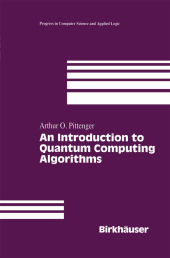 Neuerscheinungen 2012Stand: 2020-01-07 |
Schnellsuche
ISBN/Stichwort/Autor
|
Herderstraße 10
10625 Berlin
Tel.: 030 315 714 16
Fax 030 315 714 14
info@buchspektrum.de |

Arthur O. Pittenger
An Introduction to Quantum Computing Algorithms
Softcover reprint of the original 1st ed. 2000. 2012. xii, 140 S. 5 Tabellen. 235 mm
Verlag/Jahr: SPRINGER, BASEL; BIRKHÄUSER BASEL 2012
ISBN: 1-461-27127-4 (1461271274)
Neue ISBN: 978-1-461-27127-7 (9781461271277)
Preis und Lieferzeit: Bitte klicken
In 1994 Peter Shor [65] published a factoring algorithm for a quantum computer that finds the prime factors of a composite integer N more efficiently than is possible with the known algorithms for a classical com puter. Since the difficulty of the factoring problem is crucial for the se curity of a public key encryption system, interest (and funding) in quan tum computing and quantum computation suddenly blossomed. Quan tum computing had arrived. The study of the role of quantum mechanics in the theory of computa tion seems to have begun in the early 1980s with the publications of Paul Benioff [6]´ [7] who considered a quantum mechanical model of computers and the computation process. A related question was discussed shortly thereafter by Richard Feynman [35] who began from a different perspec tive by asking what kind of computer should be used to simulate physics. His analysis led him to the belief that with a suitable class of "quantum machines" one could imitate any quantum system.
[see attached for complete TOC]
Preface Acknowledgements 1. Quantum Statics 2. Basics of Quantum Computation 3. Quantum Algorithms 4. Quantum Error-Correcting Codes Afterword References Index
"Pittenger´s book, as the title suggests, explains the mathematics at the basis of quantum computing and the fundamental algorithms, including Shor´s factoring, Grover´s search and error correction algorithms....
Since quantum computing is a highly interdisciplinary science, the author has tried to capture the attention of a large variety of readers and he has mostly achieved this objective. The book can be used as a formal introductory text for graduate students as well as a fascinating, but still engaging resource for interested readers who are comfortable with linear algebra.... Pittenger helps the reader into focusing attention on the algorithmic aspects rather than the formal content and uses examples as [an] integral part of the book, illustrating the substantial meaning of quantum theory applied to computing. He also proposes some exercises to stimulate an insightful reading.... The bibliography is complete and the interested reader can improve the understanding of the book and of the entire matter by following the numerous references, acquiring in this way more tools for the comprehension of a subject of such complexity...." - SIGACT News
" An Introduction to Quantum Computing Algorithms reflects its author´s own experience in learning the mathematics and theoretical physics required for the subject, as he writes in the acknowledgements. It is generally written in a pleasant and informal style, with much motivation in between the mathematics.... In just 150 pages this book manages to explain much of the core of quantum computing, and to explain it well." - Quantum Information and Computation (QIC)
"If you have a general (fuzzy) background on quantum physics and on computer science, I recommend reading this book.... It is well written, easy to read, with many illustrating examples, and many exercises." - Zentralblatt Math


